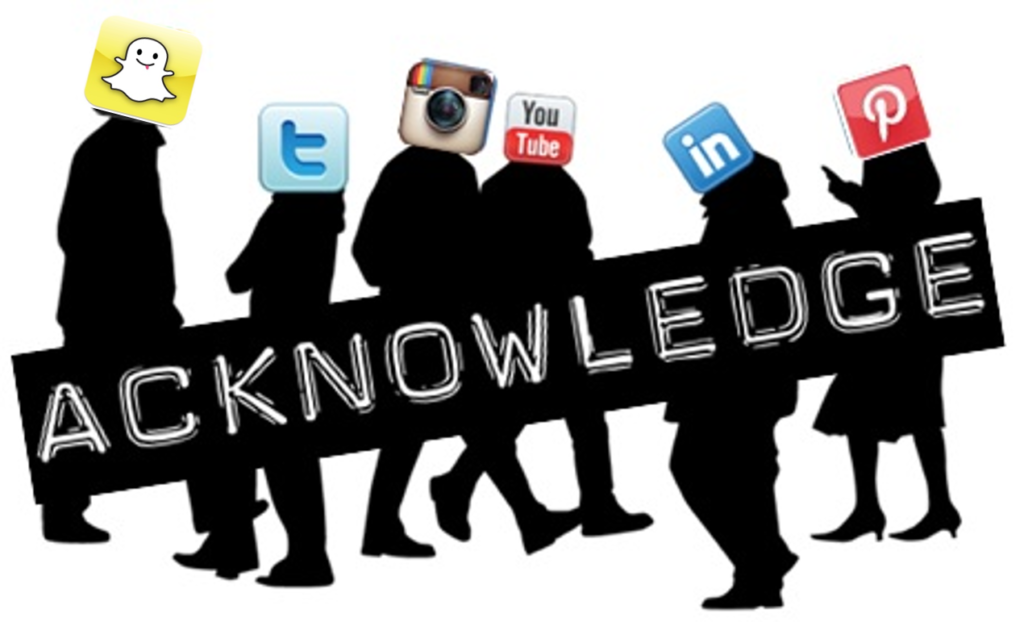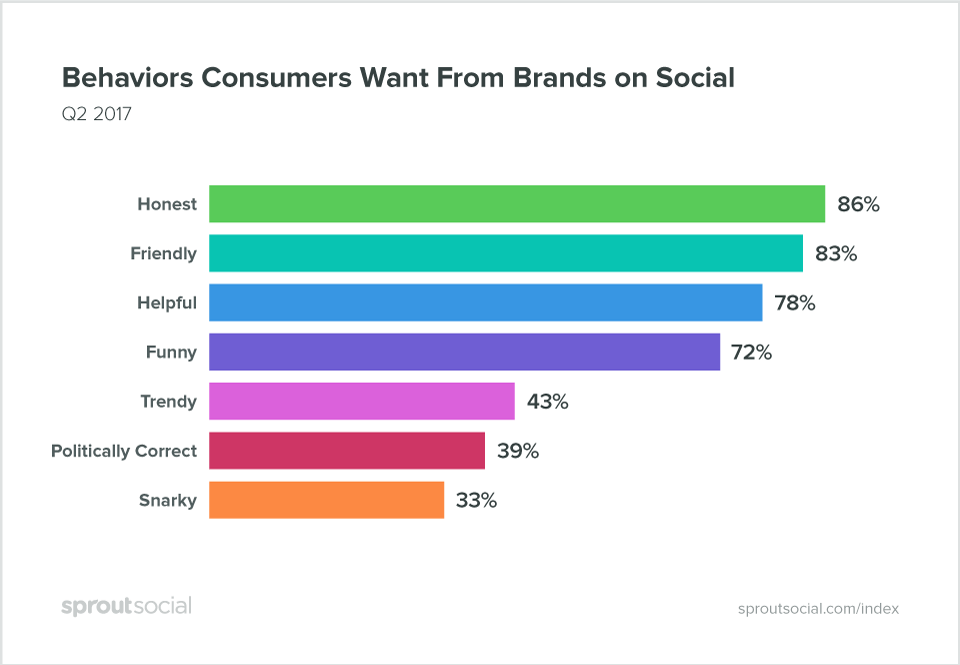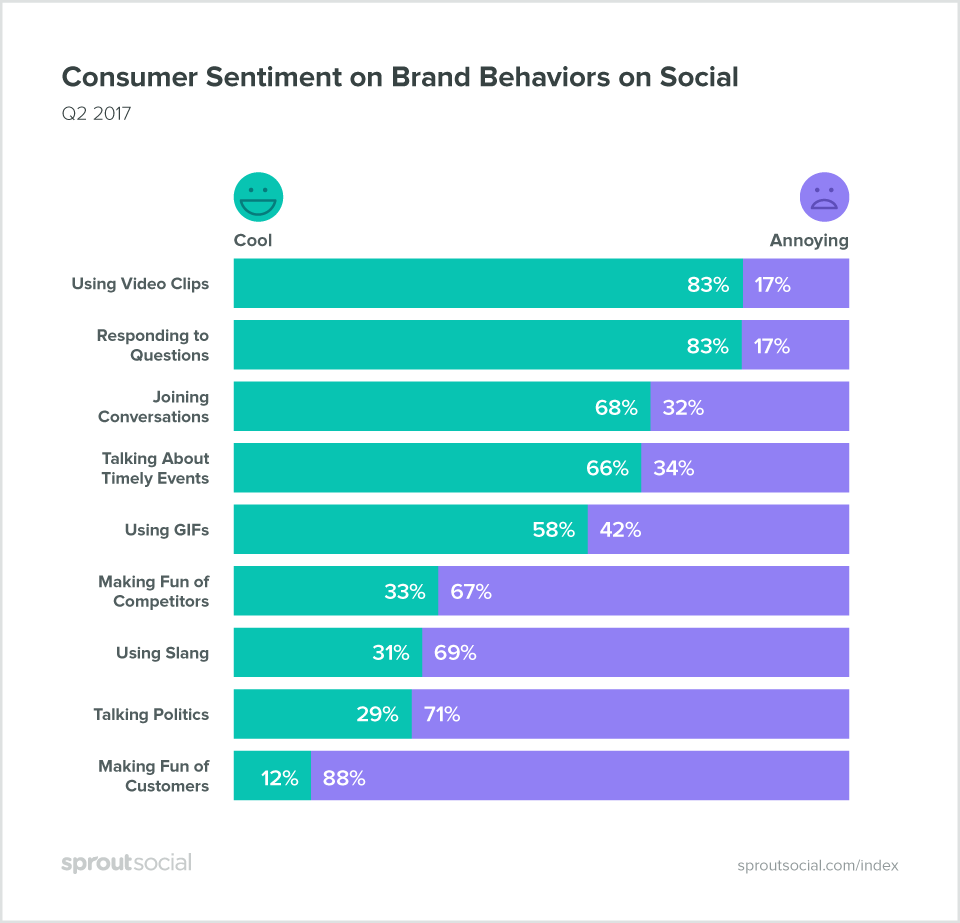
Yesterday, we looked at a new research study from Sprout Social that broke down industries by various social media measures – including Brand Engagement. And we learned that media and entertainment brands rank last when it comes to connecting with consumers in the social space. Part of the issue is that media brands are least likely to be responsive on platforms like Facebook and Twitter.
So acknowledgment matters. But so does having a social voice. And when it comes to various brands, the Sprout Social research suggests there’s a time and a place for elements like social humor (maybe more than you’d think) and snark (and probably less that you’d think).
And that’s the value of this study. It’s not always obvious about the posts, tweets, and photos that have the best chance of connecting with an audience. But the Sprout Social research makes a compelling case for focusing on optimal brand behaviors in the social space.
Sometimes in radio, we get so hung up about how often and when we post, like, and tweet that we lose sight of the messaging itself. And the study is loaded with great direction, most of which rings true to what we’ve seen in our own research, as well as our experience working with stations and personalities.
Late in this post, I’m going to recommend that personalities and station brands conduct “social airchecks” to get a better handle on the specifics of what’s being disseminated socially. But ahead of that, I’ve pulled a handful of key charts from the Sprout Social study to provide posting parameters.
And assuming a brand makes it a priority to respond to its audience on social platforms, the good news is that consumers want media and entertainment brands – yes, radio – to exude personality on Facebook, Twitter, Instagram, YouTube, and other go-to social sites.
 So while media brands place last in overall response rate to consumers as we discussed yesterday, they land in first when it comes to desiring personality from a brand socially. For a medium like radio that makes its living on personality, this is a social buying signal that should reinforce DJ, shows, and hosts to work hard on their social media personas.
So while media brands place last in overall response rate to consumers as we discussed yesterday, they land in first when it comes to desiring personality from a brand socially. For a medium like radio that makes its living on personality, this is a social buying signal that should reinforce DJ, shows, and hosts to work hard on their social media personas.
That’s a great foundation, and the study goes onto add definition to desirable content areas.
For many consumers, humor works – but so does honesty, friendliness, and helpfulness – all qualities that can help a brand better connect socially. The humor piece is interesting, and perhaps is comparable to being funny on the air. As our radio experience tells us, not every show, host, or DJ is funny.
So perhaps a social rule of thumb is that if a show (or brand) is legitimately funny on the radio, port that humor over to the social space. But conversely, if a jock is not famous for humor, then attempts at being hilarious on Facebook or Twitter – especially for a station or show where it’s not expected – may very well fall flat.
And of the most desirable social behaviors, snark is last on the list. And yet, we see a lot of it socially, as so many personalities try to inject that attitude into posts, tweets, and photos.
 And that brings us to a key finding in the Sprout Research. While humor can obviously resonate if it’s done well – and is truly funny – fans are even more likely to appreciate a station or host being responsive. And yes, that’s more affirmation about the power of acknowledgment.
And that brings us to a key finding in the Sprout Research. While humor can obviously resonate if it’s done well – and is truly funny – fans are even more likely to appreciate a station or host being responsive. And yes, that’s more affirmation about the power of acknowledgment.
While having frequency goals and working hard to come up with clever content is what many in radio focus on, the act of simply connecting and responding is easier and perhaps even more appreciated. And that’s another indicator that simply being a real person in the social space – not trying too hard cute, clever, or snarky – can be highly effective and appreciated.
And that idea of social responsiveness goes back to the fundamentals of what being a good interviewer – that is, a good listener – is all about. The mistake many make is not listening to the person being interviewed, and instead thinking of the next clever question to ask. In social media, it is often less about looking around for something cool, provocative, or funny to post, and instead, focusing on connecting with listeners on your page.
You can see this clearly in the chart below that contrasts brand behavior from cool to annoying. Right at the top of the “cool list” is the use of video clips – and we know the power of video in the social space. But tied for first is simply responding to fan questions. Both are appreciated by more than 8 in 10 respondents. Note also that joining conversations of fans and talking about current events are also highly desirable behaviors from brands. Again, it’s about being real and authentic – buzzwords that actually resonate socially.

And these are all traits that any radio station or DJ can exude socially. In fact, most are simply about connecting, engaging, and participating. They take time, but they certainly aren’t especially draining creatively. They are more about simple, reciprocal behaviors that are basic parts of human interaction.
Note also that politics is near the top of the “annoying” list. And for good reason. Outside of talk hosts known for their political bent, it is hard to make a case these days for the political arena having any place on the social spectrum, especially for music or sports stations and personalities. Yet surprisingly, I often see DJs opining, arguing, and yes, snarkily posting about political issues. Even if it’s on a personal account, consumers don’t make that distinction. Most personalities know better, but this political climate often brings out the worst in people.
There’s so much to talk about and share socially – better than jokes, snark, vitriol. and trash talk about Donald Trump or Nancy Pelosi. And for many listeners, your brand personality on Facebook, Twitter, Instagram and other social platforms should be about entertainment, fun, escape, and genuinely taking an interest in your audience.
And as this Sprout Social research concludes, a good plan is to “Focus on wins that last by giving consumers what they want: honest, helpful and friendly behavior and content.”
That’s sound advice, and a place to start is to socially aircheck yourself (or if you’re a PD or digital manager, your staff). Conduct a content analysis of your social activity over a month’s time. Are you being responsive to the audience? Is it always about humor? Do you use social media just to promote yourself or the station? Does politics sometime sneak into posts? And what does your social assessment say about you and your persona?
The Sprout Social study – like all research – is a guide and not a social media bible. But if you can use it to spark an internal conversation and an introspective look at how well you’re connecting on your station’s preferred platforms, it has value.
You can check out the entire study here.
See you on Twitter.
- Old Man, Take A Look At My Ratings - December 20, 2024
- In The World Of On-Demand Audio, How Do We Define Success? - December 19, 2024
- Scenes From The Classic Rock Highway – 2024 Edition - December 18, 2024




Leave a Reply